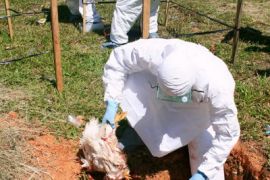While patients from outside Padang, include one from Bukittinggi, one from Pesisir Selatan District, and another from DharmasrayaJakarta (ANTARA News) - The sudden death of thousands of chickens has been reported in several cities on Sumatra Island over the past several months.
Local health authorities have confirmed that most of the chickens had died of bird flu or avian influenza (H5N1).
The poultry deaths due to bird flu have occurred among other things in the Sumatran provinces of West Sumatra, Bengkulu, Jambi and Bangka Belitung.
In Padang, West Sumatra, the M Jamil General Hospital had treated a total of 27 patients suspected of being infected with the bird flu virus since January 2011.
Padang is the worst-affected city in West Sumatra, as 24 of the total 27 patients are residents of the city, according to Gustavianof, a spokesman of the M Jamil Public Hospital.
"While patients from outside Padang, include one from Bukittinggi, one from Pesisir Selatan District, and another from Dharmasraya," he said in Padang, Thursday (March 31).
Up to Thursday, two patients were still undergoing intensive treatment at the hospital.
The hospital has taken blood samples from the two patients and sent them to the laboratory of the Jakarta-based health ministry`s Health Development and Research Agency (Balitbangkes), to confirm whether they are negative or positive of bird flu virus infection.
In 2009, the M Jamil Public hospital had treated nine bird flu suspect cases, and seven cases in 2010, including one patient that had died while being treated in the hospital.
A total of 1,866 chickens were dead in Payakumbuh city, West Sumatra Province recently.
West Sumatra has prepared two hospitals, including M Jamil Public Hospital, to give free-of-charge medical treatment to patients suspected of having been infected by the H5N1 virus.
As H5N1 virus cases have been reported in many regions in Bengkulu Province, also on Sumatra Island, the province has declared that the province is on alert of bird flu.
"Although the number of bird flu cases does not increase, Bengkulu is still cautious of bird flu, and we ask the local residents to monitor their poultry," Emran Kuswadi, Coordinator of Local Disease Control Center (LDCC), said in Bengkulu, last Tuesday (29/3).
Up to now, a total of 1,881 chickens had been killed by the bird flu virus in Bengkulu, according to Emran.
Seven districts - Bengkulu, Seluma, Lebong, Bengkulu Tengah, Kepahiang, Kaur and Rejang Lebong - have been particularly declared bird flu alert.
The worst bird flu-affected district is Seluma where 1,175 chickens died of the H5N1 virus at two sub districts, he said.
In Jambi, bird flu has reportedly killed several hundred chickens in Kerinci District, Jambi Kota, and Jambi Luar Kota neighborhoods.
The virus has infected a number of chickens in four villages of Kota Jambi subdistrict and had spread to Pijoan village, Jambi Luar Kota subdistrict.
Head of Muarojambi district`s veterinarian office Paruhuman Lubis said, "We have checked that there are chickens that suddenly died but we cannot confirm yet whether they are infected by the (bird flu) virus or not."
In Bangka Belitung (Babel) Province, at least 484 chickens had died during January and February 2011. Junaidy of the local animal husbandry office, confirmed in Pangkalpinang, that they had been infected with bird flu virus.
Despite the reports of bird flu breakout in some parts of Sumatra, there are no reports of confirmed cases of human infection with bird flu virus or fatalities on the island this year.
In fact, the health ministry recently announced a confirmed case of human infection with bird flu virus on Java Island.
The case concerned a 28 year old female from Gunung Kidul district, Yogyakarta Province. She developed symptoms on 1 March, was admitted to a health care facility on 6 March and referred to a hospital on 11 March. She died on 14 March, according to the Avian Influenza Update on the official website of the World Health Organization (WHO).
Indonesia has been infected by bird flu since 2005, but the situation has been relatively under control over the past few years.
Of the total 176 cases confirmed to date in Indonesia, 145 have been fatal, according to WHO.
According to the WHO fact sheet, Avian influenza (AI), commonly called bird flu, is an infectious viral disease of birds. Outbreaks of AI in poultry may raise global public health concerns due to their effect on poultry populations, their potential to cause serious disease in people, and their pandemic potential.
The majority of human cases of H5N1 infection have been associated with direct or indirect contact with infected live or dead poultry. There is no evidence that the disease can be spread to people through properly cooked food. Controlling the disease in animals is the first step in decreasing risks to humans.
The Indonesian health and agriculture ministries have received helping hands from countries such as the United States and Australia in fighting the bird flu problem.
The Australian Government has set up a $22 million, four-year project to help Indonesia control the spread of bird flu.
"The news comes after two people died in West Java of bird flu, and more cases of sick birds were reported in Bali," ABC reported on March 28, 2011 .
A project called the Strategies Against Flu Emergence (SAFE) is launched by the US government in partnership Indonesia to reduce the impact of Avian Influenza (AI) on animals and humans and limit the threat of pandemic influenza in Indonesia.
"Avian influenza continues to pose a serious public health and pandemic threat for Indonesia and the world," USAID/Indonesia Mission Director Walter North said in a press release issued by the US embassy in Jakarta Friday (April 1).
The SAFE project will collaborate with the United Nations Food and Agriculture Organization (FAO) and WHO to promote early detection and healthier behavior in AI high-risk districts.
(F001/A038)
Reporter: Fardah
Editor: Aditia Maruli Radja
Copyright © ANTARA 2011




